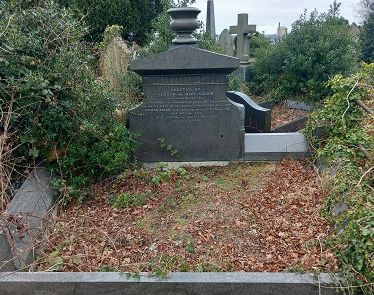William Gibson

If his published record is to be believed William Gibson, William Kennedy Gibson, is one of the few players, who made more appearances for country, thirteen in all, than club. It seems unlikely but then his early career is just that. He was born in 1876 and is said not just to have started playing for his Irish team, Cliftonville, whilst still at school. Certainly he scored his first goal for the club aged sixteen but won his first Irish cap at seventeen. It was against Scotland, the land of his birth.
Gibson had been born on Langside Road in Govanhill in Glasgow, in the then hotbed of Scottish football, the elder son of Scottish parents. His father, a shipping clerk cum agent, was from New Cumnock, his mother from Campbeltown. At four years old the family was still there at 21, Langside but it seems that after that it transferred, quite when it is unknown, which makes it unclear on which side of the Irish Sea young William had his football grounding. However, the suggestion is in Scotland as his father clearly also had an interest in the game. He would be President of both Cliftonville and Vice-President of the Irish Football Association.
In Belfast the Gibsons clearly prospered. Andrew Gibson had moved to the city to be agent for a shipping line. He was to add Cunard to his portfolio. Meantime on winning his second cap son William scored the goal that produced Ireland's first draw indeed non-defeat to England yet then seemed to fall out of the international picture. It may have been because on leaving school he was training as a solicitor. But he continued to turn out for Cliftonville, was in the 1895 Irish team against Scotland once more still as a forward before switching to full-back. With Cliftonville he won the Irish Cup in 1897 then in 1898 was appointed Irish captain against Wales, one of four occasions. It was to be Ireland's first victory ever on foreign soil. The Cup was won again in 1901 with him still living with the family and now fully qualified. And it was perhaps that which allowed him to go out on something of a limb. He crossed the water, in March 1902, as an amateur still, playing the last match of the season for League Champions Sunderland and in May one for Bishop Auckland. Then after returning to Cliftonville he repeated his flirtation with England's North East, turning out in April 1903 for Sunderland Royal Rovers.
But his English adventure was even at just twenty-six to be something of a swan-song. He had won his last Irish cap in 1902. A knee injury would cause him to cease to play but not to be involved with the wider game professionally. And he turned to politics, football and otherwise, and other matters. In 1907 he like his father became Vice-President of the IFA. In 1909 he was elected to the Belfast City Council. In 1912 he negotiated a settlement to a dispute between the clubs and the I.F.A. over Irish Cup gate receipts. And in 1914 at the age of thirty-seven he seems to have married and turned his attention to other matters still - poetry and the foundation of the Belfast Rotary Club. And in 1929 he even stood, albeit unsuccessfully, in the Northern Ireland general election. He would die in 1949 at the age of seventy-three much lauded and be buried in Belfast's City Cemetery.

Birth Locator:
1876 - 4, Hope Terrace, Langside Road, Govanhill, Glasgow
Residence Locations:
1881 - 21, Langside Road, Govanhill, Glasgow
1901 - 8, Cliftonville Ave., Clifton, Antrim, Northern Ireland
1911 - 2, Landsdowne Road, Belfast
1949 - 763, Antrim Road, Belfast
Grave Locator:
Belfast City Cemetery, Plot K9
Other Locations:
Back to the Irish Trail or
to the Queen's Park and Glasgow Southside Trail
or the SFHG Home page